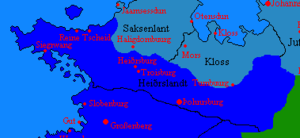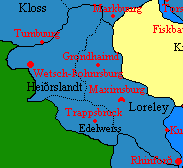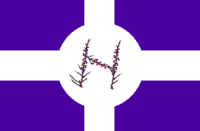Heathersland
| Heathersland | |
| Subdivision type: | canton |
| Capital: | Thornsburg |
| Population: | 547,405 |
| Largest Cities: | Thornsburg |
|
| |
| Local Leadership Title: | Deputy |
| Local Government: | Grand Council |
| Current leader: | Milo Von Tommen |
|
| |
| Local language: | Lac Glaceian (official), Slobovian |
| Local Religion: | The Alpine Temple |
Heathersland (Slobovian: Heiðrslandt; Arminian: Heverslond) is a former canton of the Grand Duchy of Lac Glacei. In 1696 AN the Lord of Thornsburg agreed to a peaceful reunion with Lac Glacei and was reinvested as a canto, with His Lordship retaining the title and assuming the position of Deputy within the legislature. Unlike other regions within Lac Glacei, Heathersland has a primarily Slobovian population. It is considered culturally unique and the last vestige of Slobovian culture on Micras.
As its name suggests, Heathersland is covered by vast heath lands covered by the eponymous heather plant (Erica micronica). The small bell-like flowers carpet the landscape in hues of purple and white, and these two colors have long become associated with the canton (hence the flag). This shrubland habitat extends from east to west and is hemmed in by mountain ranges in Edelweiss and Lorelei. Scientists suspect that the area was once inundated with water during a former glacial epoch when Lake Glacei was much larger. The topography is relatively flat, or low rolling hills, with sandy loam soils. Vegetation consists of heather, gorse, broom and grasses. Poor soil fertility is partly to blame for the region's relatively low population.
Following reunification with Lac Glacei, the grand duchy began exploration drilling for potential oil reserves under the peat-laden moors, and successfully tapped three large reservoirs. These are the first domestic oil reserves to be found within the entire grand duchy, and are now utilized as an important source of domestic oil production.
History
Heathersland has very old roots, dating back to its founding around 1578 ASC 1490 AN by Slobovia. The region had previously been known by Ashintully, a name applied by Menelmacar after it acquired the region from the People's Republic of Hell. Ashintully meant Mighty Volcano in ancient Dagoran and referred to the series of semi-active volcanoes in the northwestern region of Heathersland (as of 7986 ASC/1697 AN now part of Meckelnburgh). After the collapse of Menelmacar the region was annexed by Slobovia. Slobovia renamed it Heiðrslandt (Heathersland) for the vast heath lands that occupy the central flatlands of the region. The Slobovian ruler, Tregh Tomsohnd, presented the region as a bridal gift to his new wife, also named Lady Heather, who was born there. During this time heavy investment and migration from Slobovia helped develop Heathersland, and major cities such as Thornsburg (Þohnrsburg) were established. The region began to despair when Tomsohnd's wife was tragically killed in an avalanche. Tomsohnd began to despise the region following his wife's death, shunning its very existence.
Soon after, Slobovia was subjected to the Gobbler Attacks (a type of avian flu epidemic) that effectively paralyzed the nation. Between neglect from Grøßenburg and the epidemic, Heathersland was nearly depopulated. It came as no surprise when Slobovia collapsed completely a few years later. But Heathersland somehow struggled on, and opted to join Arminy in union with the neighboring states of Lorelei and Edelweiss, forming the Principality of Stromblum. Although only a fraction of its former lands remained, Heathersland thrived for a time within Stromblum, and became one of Arminy's most productive regions. Alas the Crab Plague brought yet another epidemic to the country, one which Heathersland could not survive, and the country collapsed completely. The region remained under control of petty warlords until the coming of Gralus. The Gralans would occupy the region until around 5336 ASC (1610 AN) when they too eventually collapsed and the area reverted to the Green.
In 7870 ASC (1693 AN) the Grand Duchy of Lac Glacei was restored and the Grand Duke signaled his intent to reclaim the country's historic lands. Inroads were made and about half of Lorelei's lands have been restored. Only recently has attention been given to reclaiming Heathersland. Following Operation Maximus in 1696 AN, the independent leaders of Heathersland agreed to join Lac Glacei and the territory was successfully reclaimed and incorporated once more as a canton. Milo von Tommen, previously Lord of Thorsnburg, was elected as Deputy to represent the canton in the Lac Glaceian parliament.


